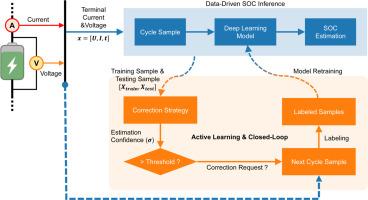基于数据驱动的锂电池生命周期充电状态估计的主动学习驱动误差控制
IF 9.6
Q1 COMPUTER SCIENCE, ARTIFICIAL INTELLIGENCE
引用次数: 0
摘要
锂离子电池荷电状态(SOC)的准确估算对于电动汽车的安全高效运行至关重要。然而,在电池老化的情况下,数据驱动和模型驱动的SOC估计方法都面临着重大挑战,因为电池老化会改变内阻和电化学性能,尤其是在复杂的老化轨迹下。大多数现有的深度学习和基于模型的方法以开环方式运行,缺乏不确定性量化、准确性预测或自适应校正的机制,导致老化过程中不受控制的估计误差。为了解决这个问题,我们提出了一种创新的闭环SOC估计框架,该框架将主动学习与不确定性感知校正集成到深度学习网络中,无需额外的传感器或参考数据即可实时反馈SOC预测置信水平。具体而言,我们量化了包括长短期记忆(LSTM)网络和高斯过程回归(GPR)在内的主流数据驱动方法在复杂老化路径下的性能下降。我们证明了基于模型分歧的主动学习校正策略在整个电池生命周期中保持了鲁棒性。实验结果表明,在整个老化过程中,只要进行4次主动再训练,我们的方法就能将平均SOC估计误差降低到1.5%以下,将基于最大周期的平均误差降低到2%以下。这项工作为不确定性信息、生命周期弹性和数据高效的SOC评估奠定了基础,标志着电池管理系统在现实电动汽车应用中的重大进步。本文章由计算机程序翻译,如有差异,请以英文原文为准。

Active-learning-driven error control for data-driven state of charge estimation across the lithium battery lifecycle
Accurate estimation of lithium-ion battery state of charge (SOC) is crucial for the safe and efficient operation of electric vehicles (EVs). However, both data-driven and model-driven SOC estimation methods face significant challenges under battery aging, which alters internal resistance and electrochemical properties, especially across complex aging trajectories. Most existing deep learning and model-based approaches operate in an open-loop manner, lacking mechanisms for uncertainty quantification, accuracy prediction, or adaptive correction—leading to uncontrolled estimation errors during aging. To address this, we propose an innovative closed-loop SOC estimation framework that integrates active learning with uncertainty-aware correction into deep learning networks, enabling real-time feedback on SOC prediction confidence levels without the need for additional sensors or reference data. Specifically, we quantify the performance degradation of mainstream data-driven methods, including long short-term memory (LSTM) networks and Gaussian process regression (GPR), under complex aging paths. We demonstrate that our model-disagreement-based active learning correction strategy maintains robustness throughout the battery lifecycle. Experimental results show that with only four active retraining sessions over the full aging process, our method reduces average SOC estimation error to below 1.5 %, and maximum cycle-based average error to below 2 %. This work establishes a path toward uncertainty-informed, lifecycle-resilient, and data-efficient SOC estimation, marking a significant advancement in battery management systems for real-world EV applications.
求助全文
通过发布文献求助,成功后即可免费获取论文全文。
去求助
来源期刊

Energy and AI
Engineering-Engineering (miscellaneous)
CiteScore
16.50
自引率
0.00%
发文量
64
审稿时长
56 days
 求助内容:
求助内容: 应助结果提醒方式:
应助结果提醒方式:


